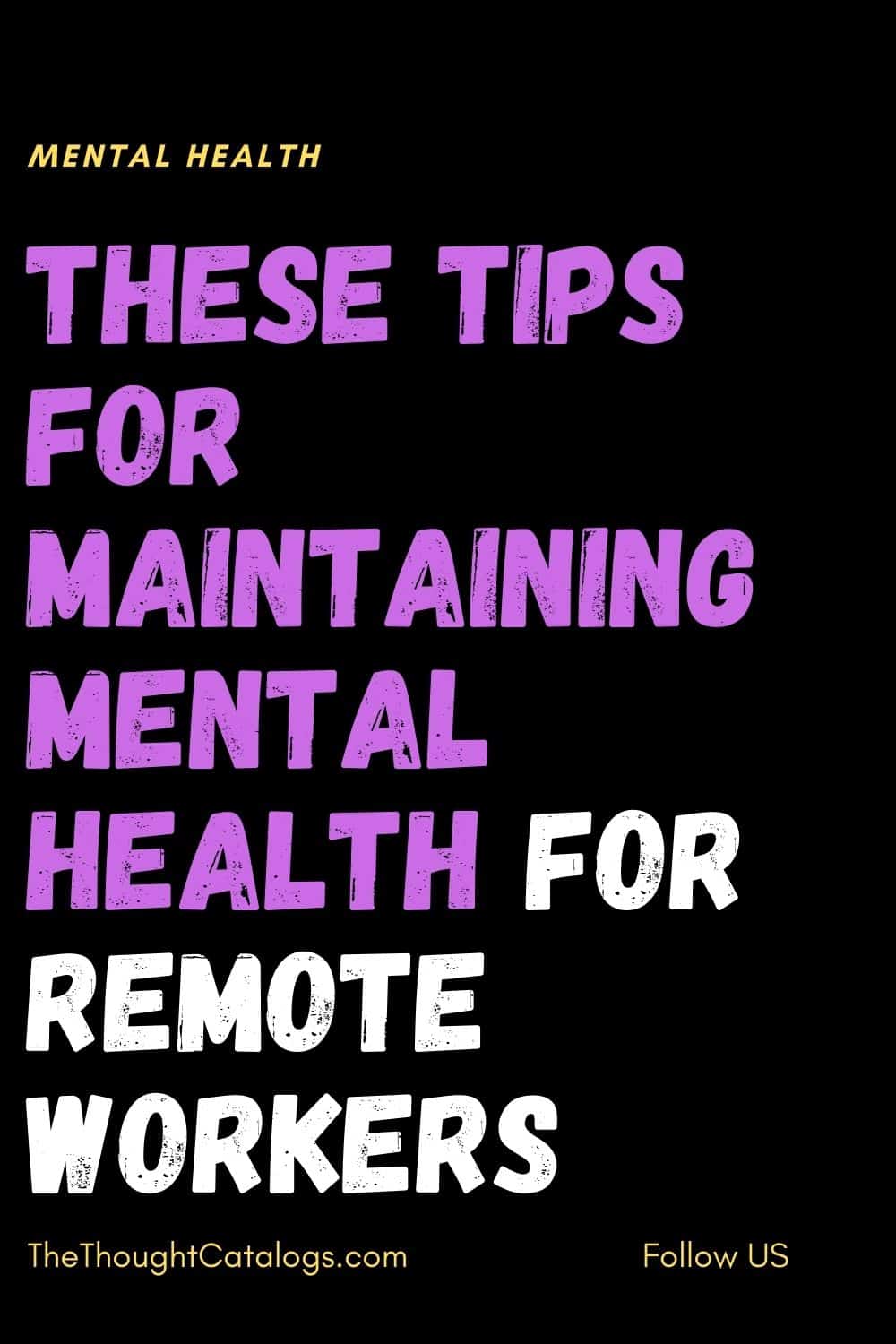These Tips For Maintaining Mental Health For Remote Workers

In today’s digital age, remote work has become increasingly common. With the flexibility and convenience, it offers, more and more individuals are embracing the opportunity to work from the comfort of their homes. However, while remote work brings numerous benefits, it also poses unique challenges, particularly when it comes to maintaining mental health. In this article, we will explore some effective tips to ensure the well-being of remote workers.
I. Introduction
As the nature of work continues to evolve, remote work has emerged as a viable option for many professionals. This work arrangement allows individuals to perform their job duties outside of a traditional office environment, often from the comfort of their homes or other remote locations. While this offers flexibility and freedom, it also comes with its own set of challenges, including the potential impact on mental health. Remote workers must prioritize their well-being and implement strategies to maintain their mental health.
II. Create a dedicated workspace
One of the key factors in maintaining mental health as a remote worker is to create a dedicated workspace. Having a designated area for work helps establish a clear boundary between professional and personal life. Set up a space that is solely dedicated to work, ideally a separate room or a quiet corner in your home. This will help you mentally transition into a work mindset and enhance focus and productivity. Additionally, ensure your workspace is comfortable and ergonomically designed to prevent physical strain and discomfort.
III. Establish a routine
Remote work offers the flexibility to set your schedule, but it’s important to establish a routine to maintain a sense of structure. Set regular working hours that align with your productivity patterns and communicate them clearly to your colleagues and clients. Having a consistent routine not only helps you stay organized but also allows you to maintain a healthy work-life balance. Incorporate breaks and exercise into your daily routine to promote physical and mental well-being.
IV. Maintain work-life balance
One of the challenges remote workers often face is the blurring of boundaries between work and personal life. It is essential to establish clear boundaries to maintain a healthy work-life balance. Set specific start and end times for work and try to stick to them. Avoid overworking and be mindful of the importance of leisure and relaxation. Disconnect from work-related activities outside of your working hours and engage in activities that bring you joy and fulfillment.
V. Stay connected with colleagues
Working remotely can sometimes lead to feelings of isolation and disconnection. To combat this, it is crucial to utilize communication tools effectively and stay connected with your colleagues. Schedule regular virtual meetings to discuss work-related matters and maintain social interactions. Foster a sense of camaraderie by engaging in casual conversations and virtual team-building activities. These connections will not only boost your mood but also enhance collaboration and productivity.
VI. Prioritize self-care
Taking care of your mental and emotional well-being is paramount for remote workers. Practice stress management techniques such as deep breathing exercises, meditation, or mindfulness. Engage in activities that promote relaxation, such as listening to music, reading a book, or taking a walk. Make time for hobbies and activities that bring you joy and recharge your energy. Prioritizing self-care will help you maintain a positive mindset and cope with the challenges that may arise.
VII. Seek social support
Maintaining social connections is vital for mental health, especially for remote workers who may have limited face-to-face interactions. Stay connected with friends and family through phone calls, video chats, or social media. Join online communities or support groups specific to your profession or interests. These networks provide a sense of belonging and allow you to share experiences, seek advice, and offer support to others facing similar challenges.
VIII. Practice mindfulness
Mindfulness is a powerful tool to cultivate mental well-being. Incorporate mindfulness practices into your daily routine, such as meditation or deep breathing exercises. These techniques help you stay present, reduce stress, and improve focus. During work hours, practice mindfulness by focusing on the task at hand and avoiding distractions. Cultivating mindfulness will enhance your overall mental resilience and help you navigate the demands of remote work more effectively.
IX. Manage distractions
Working remotely can expose you to various distractions, ranging from household chores to social media notifications. It is essential to minimize interruptions in your work environment to maintain focus and productivity. Create a work environment free from unnecessary distractions, and use productivity tools to stay organized and on track. Techniques such as the Pomodoro Technique, which involves working in focused intervals followed by short breaks, can help you manage distractions effectively.
X. Take regular breaks
Taking regular breaks throughout the workday is crucial for maintaining mental well-being and productivity. Incorporate short breaks to rest and recharge. Use this time to engage in physical activity or hobbies that help you relax and rejuvenate. Stepping away from your workspace allows your mind to reset and refocus, leading to improved concentration and creativity.
XI. Set goals and celebrate achievements
Setting clear goals and objectives is essential for maintaining motivation and a sense of accomplishment. Establish realistic and measurable goals for your work and celebrate your achievements along the way. Reward yourself for completing tasks or reaching milestones, whether it’s treating yourself to something you enjoy or taking time off to relax. Recognizing your progress will boost your confidence and enhance your overall job satisfaction.
XII. Monitor and adapt
Regularly assessing your mental health and well-being as a remote worker is crucial. Monitor your stress levels, emotional state, and work satisfaction to identify any potential areas for improvement. Be open to making necessary adjustments to your routine, workspace, or self-care practices to enhance your overall well-being. Adaptability is key to maintaining mental health in the ever-evolving landscape of remote work.
XIII. Conclusion
Maintaining mental health as a remote worker is of utmost importance. By implementing these tips, you can create a conducive work environment, establish a routine, prioritize self-care, stay connected with colleagues, and manage distractions effectively. Remember to monitor your mental well-being regularly and make adjustments as needed. By taking care of your mental health, you can thrive as a remote worker and achieve a fulfilling and balanced work-life experience.
XIV. FAQs
1. How can I create a dedicated workspace at home? To create a dedicated workspace at home, choose a quiet area that is separate from your living space. Set up a desk or table, invest in a comfortable chair, and ensure proper lighting. Keep your workspace organized and free from distractions.
2. What are some effective stress management techniques? Effective stress management techniques include deep breathing exercises, meditation, physical activity, journaling, and engaging in hobbies. Find what works best for you and incorporate these techniques into your routine.
3. How can I maintain a work-life balance as a remote worker? Maintaining work-life balance as a remote worker requires setting boundaries, establishing a routine, and prioritizing self-care. Clearly define your working hours, take regular breaks, and engage in activities outside of work that bring you joy and relaxation.
4. What are the benefits of staying connected with colleagues? Staying connected with colleagues as a remote worker helps foster a sense of belonging, enhances collaboration, and reduces feelings of isolation. It also allows for effective communication, knowledge sharing, and support in work-related matters.
5. How can I avoid distractions and stay focused while working remotely? To avoid distractions while working remotely, create a designated workspace, use productivity tools, and minimize interruptions. Practice time management techniques, such as the Pomodoro Technique, and set boundaries with family members or roommates to ensure uninterrupted work time.




